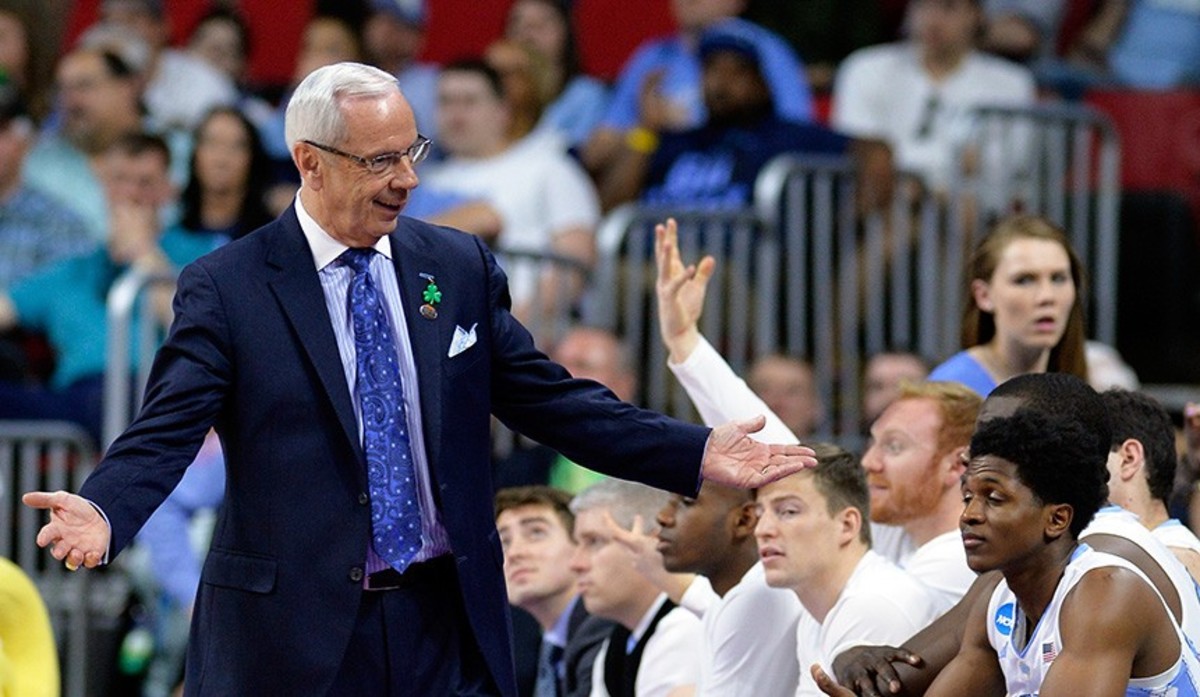For North Carolina, playing with consistency & intensity will be the keys to a Final Four run

[video: 13724935]
RALEIGH, N.C. — Shortly after 10:30 Saturday night, North Carolina coach Roy Williams emerged from a darkened tunnel at PNC Arena with his top-seeded Tar Heels in a suddenly familiar dilemma, locked into tight game at halftime against a less talented but hungry opponent. For Williams, the 34–30 score against ninth-seeded Providence served as a moment of déjà vu, since North Carolina had led No. 16 Florida Gulf Coast by a point, 41–40, of its first-round NCAA tournament East Regional game just two days earlier. Against the Eagles, though, Carolina had opened the second half on a 32–10 run en route to an 83–67 victory. The outcome against the Friars remained unwritten.
While the Tar Heels warmed up for the second half, Williams quietly hoped his players would turn on the jets once again in the final 20 minutes. "We came out in the second half, and somebody told me, boy, whatever you told them at the half two nights ago, I hope you told them again," Williams said afterward.
Whatever Williams's locker-room soliloquy was, it did the job. North Carolina avoided joining the ranks of upset victims this March by breaking a 41-all tie and outscoring Providence 44–25 over the final 15:30 for an 85–66 win. The victory pushed the Tar Heels into their NCAA-record 27th Sweet 16 and their eighth under Williams, who is second alltime in NCAA tournament wins (67) behind Duke's Mike Krzyzewski (90).
As North Carolina prepares for Indiana on Friday night in the East Regional in Philadelphia, its dreams of a championship run remain intact. But despite two lopsided victories, the Tar Heels struggled to play consistently like a dominant No. 1 seed during their first two NCAA tournament games. Slow starts and lackadaisical defense plagued stretches of otherwise impressive wins over the Eagles and Friars. Now North Carolina, perhaps the most talented team in the country, must focus on playing more complete games if it wants to earn a spot in the Final Four. "I think we're always going to be a target, no matter how good a team is," junior forward Kennedy Meeks said. "I just think anybody would like to beat us. But it's up to us to not let that happen."
Indeed, the Tar Heels know opponents relish the opportunity to upend one of college basketball's premier brands. Yet at moments during the regular season, North Carolina played with a tangible lack of intensity. That manifested itself against Florida Gulf Coast, which hit 60% of its shots in the first half against Carolina as it made a bid to become the first 16-seed ever to beat a No. 1. Despite playing a de facto home game at PNC Arena, just 21 miles from the Dean E. Smith Center in Chapel Hill, the seasoned Tar Heels looked shell-shocked as the first half. A blistering halftime speech from Williams—"He said everything that was on his mind and he was very pissed off at us about it," said senior forward Brice Johnson—helped shake UNC from its doldrums, and the Heels quickly buried the Eagles under a barrage of easy baskets.
Providence presented a different challenge in the second round, with its high-scoring duo of junior guard Kris Dunn, the two-time Big East Player of the Year, and muscular sophomore forward Ben Bentil. But North Carolina still struggled to keep its foot on the gas early against the Friars. Even with Dunn saddled with foul trouble, the Tar Heels coughed up seven turnovers in the first 20 minutes, and two more early in the second half led to fast-break baskets by Dunn that gave Providence a brief, 36–34 lead. It wasn't until Carolina staged second-half runs of 8–0 and 10–0 that it managed to cement a double-digit victory.
Playing against lower seeds with nothing to lose is not an unusual challenge to Williams. The 65-year-old has has been a head coach at two programs—Kansas and North Carolina—that routinely carry bulls-eyes on their backs. And in the early rounds of March, Williams knows a talent advantage doesn't always determine effort. "You're playing against North Carolina," Williams said. "That's a pretty good deal with a lot of [teams]. They're going to come out fired up. Sometimes we've matched it, sometimes we haven't."
Speaking to reporters after the win over Providence, the coach harkened back to a mid-season stretch in which North Carolina often failed to play with the requisite intensity. Its jarring 74–73 loss to Duke in Chapel Hill on Feb. 17 represented the team's third defeat in five games. "Everybody starts abandoning ship because we lost to Duke at home," Williams said. But the Tar Heels eventually righted that ship with a renewed appreciation for defense. Since that loss to the Blue Devils, they've dropped just one other game—79–74 on Feb. 27 at Virginia, a fellow No. 1 seed—and they claimed the outright ACC regular season title with a 76–72 victory over the Blue Devils at Cameron Indoor Stadium in the regular-season finale.
In the ACC tournament that followed, North Carolina showed signs of what was to come in Raleigh, both good and bad. Playing in Washington D.C., the Tar Heels fell behind quarterfinal opponent Pittsburgh 8–0 and led by just four at the half before rolling to an 88–71 win. In the semifinals against Notre Dame it was 23–22 Carolina before UNC closed the half on an 18–0 run and went onto a 31-point blowout victory. The Heels then used their best defensive stretch of the season to key a 15–2 spurt that turned a four-point deficit into a nine-point lead in the title game win over the Cavaliers, giving UNC its first ACC tournament title since 2008.
In all, North Carolina has held its last four opponents to less than one point per possession, representative of a stingy defense that went missing for key stretches in February. Plus, its offense now ranks fifth nationally in efficiency, forming a final product that closed its last two games in spectacular fashion.

Grant Halverson/Getty
"I feel like this is the most talented team that I've been on in my three years here," said junior guard Nate Britt.
But talent doesn't always translate to national championships, and the Tar Heels can't afford to dig themselves into early holes against top-tier teams. That challenge begins on Friday, when North Carolina meets fifth-seeded Indiana. Like the Tar Heels, the Hoosiers have won five NCAA titles, and they won't cower at the tradition of North Carolina, especially after they just knocked off another blueblood, No. 4 seed Kentucky, in the second round. Indiana senior guard Yogi Ferrell is one of the most exciting players in basketball, while freshman forward Thomas Bryant was huge against the Wildcats, scoring 15 of his 19 points in the final eight minutes. But the Hoosiers will be tested against a trio of Tar Heels forwards—first-team All-America Brice Johnson, ACC sixth man of the year Isaiah Hicks and Meeks—that may be the most formidable front line in the tournament.
As North Carolina prepared to depart the tournament's first weekend, a sense of calm seemed to linger over its players. Meeks, resting in the corner of North Carolina's locker room that was situated just a few yards off the playing floor at PNC Arena, was asked if the Tar Heels were guilty of overlooking opponents, perhaps ahead to a spot at the Final Four in Houston. The 6'9'' junior shook his head. "You don't look that far," Meeks said. "That's how you mess yourself up as a team."
This team has managed to overcome its own mistakes thus far in the tournament. Starting Friday, the Tar Heels must play with 40 minutes of intensity to ensure they have more than 40 minutes left in their season.
